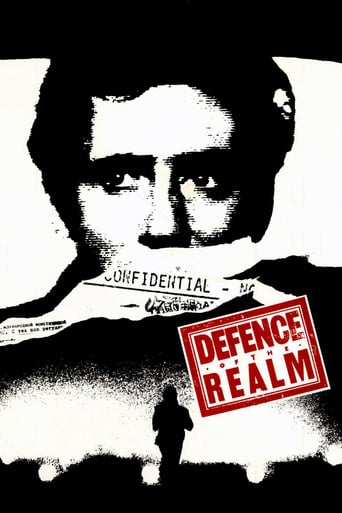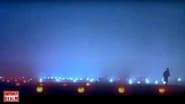Matthew Kresal
Beginning with the later years of the Cold War and extending to this very day, there has been this question about the enemies of a nation: are the ones within more dangerous then the external ones? This question has produced quite a few intriguing thrillers over the years and one such is Defence Of The Realm from 1986. This film looks at that question from the perspective of late Cold War UK politics and in turn presents a realistic yet tense thriller in the process.The film has a fine cast of some of the UK's best actors and character actors of the time. Leading the cast is Gabriel Byrne as reporter Nick Mullen who finds himself writing one story and then follows a trail of breadcrumbs that leads him to discovering he has in fact been used. That trail of breadcrumbs belongs to Mullen's colleague and mentor of sorts Vernon Bayliss in a BAFTA winning performance from Denholm Elliott who makes the most of a small part. Helping Mullen is Greta Scacchi as Nina Beckman, the assistant to a Parliament member (played by Ian Bannen) caught up in the events. They are aided by Bill Paterson as Mullen immediate boss and opposed by David Calder as the newspaper's editor and Fulton Mackay as the owner of the newspaper Mullen works for. Also in a small role is an early appearance from Robbie Coltrane as a fellow reporter in a few scenes. The result is that the film is well anchored by a fine cast.The film is helped out by the realism of the production values. This is especially true of the production design of Roger Murray-Leach who, working with what was likely a small budget, nonetheless created a whole plethora of sets ranging from newsrooms to a U.S Air Force base before taking us inside the secret halls of the government. Roger Deakins cinematography gives the film a sense of claustrophobia at all times even when the film ventures into wide open spaces. The result of this is amplified by the editing of Michael Bradsell and the score from Richard Harvey to create an almost continuous sense of menace throughout the film. All this comes together under the direction of David Drury to give the film a strong sense of realism.The production values though take that realism from the script by Martin Stellman. The script looks at the question mentioned in this review's opening and does so through the lens of late Cold War Britain. At a time when Cold War tensions were increasing and a good deal of the public clamored for the government to do something about it, the film looks at how far a government and its national security apparatus might go to prevent a scandal that could bring about just that. What appears to be just another sex scandal involving a high ranking member of the British Parliament who has ties to the Defence establishment ( that is itself is highly reminiscent of the 1963 Profumo affair) might in fact be covering up something that seems completely unrelated: a police chase of two escaped teenage prisoners that accidentally crossed over onto a U.S Air Force base sometime before. The script takes Mullen and those he encounters on a journey into the secret workings of the British government. As it reaches it climax the film asks an important question: when does a government's ability to protect secrets cross the line into becoming something much more darker, threatening and even criminal? By combining a fine cast, production values and a fine script Defence Of The Realm is able to create a realistic yet tense thriller. While it may be set and more or less about late Cold War UK politics, the film asks questions that are relevant today. All of these elements come together to make Defence Of The Realm far more then just another thriller and ever watchable nearly twenty-five years on from its original release.
Shiphrah Kovacs
This film is set in 1984, and is highly indicative not only of the spirit of the time, but also of newspaper culture and practices of the 1980s.The cold war was in full swing in 1984. The Thatcher/Reagan collaboration was comforting to some, and deeply disconcerting to others. The threat of nuclear war was profoundly feared, and sex scandals dogged (but never completely undermined) the Conservative government. The presence of US Air bases in the UK was similarly a matter of national ambivalence.The newspaper industry was vastly different from today's industry. Each newspaper had its own print unit, and computers were the exception rather than the rule. The culture of lunchtime drinking and an all-male working environment were part of Fleet Street life - and of course in 1984 the major English newspapers and agencies were still based in Fleet Street.One scene in particular stands out as a symbol of past times: a character is retiring and all the newspaper staff congregate in the printing press for a noisy beating of printing blocks on tables. The practice was commonplace in the mid-1980s, and has died out since the introduction of new technologies. The changes had begun in the early 1980s, but were precipitated by the move of the Times and associated publications from Grays Inn Road (near Fleet Street) to Wapping in 1986.I watched Defence of the Realm for the first time in 1987 and since then I've come back to it about once a year; I notice something new every time. I'm a huge fan of Denholm Elliott and he is impressive as always, playing a washed-out hack with a drink problem (sadly all too common among journalists of the late 20th century). His character Vernon Bayliss dies in suspicious circumstances while working on a secret story, which Gabriel Byrne's character Nick Mullen pursues. Byrne is at the beginning of his film career and he deserved more recognition than he got for this film; his performance is solid and convincing as a journalist caught in the dilemma between the need to sell news and the need to report the truth. Assisted by Nina (Greta Scacchi), the secretary of an MP who is being framed, Nick finds himself watched, followed, and threatened by government security personnel. Scacchi's character is reserved but brave, and her performance, like Byrne's, is understated. This is absolutely necessary to prevent the film slipping into melodrama, and is no doubt the source of comments in other reviews about the British character of the whole film. Other comments in previous reviews, such as scorn for supposed America-bashing, are anachronistic. The film's political concern is not with America's status as a superpower, but with Britain's participation in undemocratic means of maintaining the defence of the realm.The film is best understood as a comment on its own historical context rather than as a universal or timeless thriller. It shows us where we have come from and points to features that have developed in new ways in contemporary culture (e.g. the importance of fear of the 'Other' now expressed as a fear of Islam rather than of Soviet powers). The musical score is excellent; it adds greatly to the sense of danger and suspense and of course contributes to the historical feel of the film. The script is similarly sharp and suitable; nothing is wasted.I've enjoyed this film over and over, since shortly after its first release until the present day. I lived in London throughout the 1980s and remember very well the zeitgeist: the hopes and fears of the decade. The Berlin wall came down in 1989 and Thatcher lost her power in 1991; since then everything has changed. But in 1984, the world of Defence of the Realm was the world we lived in.
didi-5
With a mouthwatering cast (Gabriel Byrne, Denholm Elliott, Fulton Mackay, David Calder, Ian Bannen, Greta Sacchi, etc.) this film promises a lot and more or less delivers. Set in a newsroom against the backdrop of political scandal and cover-ups, 'Defence of the Realm' keeps you watching and keeps you guessing.It is a shame that the ending is a bit of a let-down, coming far too abruptly and leaving the viewer cheated of a really tight finale. But it is a minor grumble, and although this film is far from a classic there is much to recommend it. And incidentally, good use of music at the moments where a bit of tension is needed.
heedarmy
This taut, underrated little thriller might be called a British version of "The Parallax View". Ian Bannen plays a Profumo-like MP targeted by the security services because he knows too much. His career is ruined by muck-raking reporter Gabriel Byrne but the latter's determination to get to the bottom of the story, and his guilt at the death of a colleague (the superb Denholm Elliott), lead him down unexpected political byways..."Defence of the Realm" can boast excellent location work and a convincing recreation of the vanished world of the "old" hard-drinking Fleet Street. The tone becomes darker and more claustrophobic as the film goes on and the apolitical Byrne enters a paranoid world of car headlights in the rearview mirror, bugged telephones and rifled apartments. The film taps into many of the issues that concerned the British Left in the mid-eighties (secrecy, American missiles on UK soil, the unaccountability of the security services, newspaper obsession with sexual gossip to the exclusion of harder material) and builds to a clever, if shocking, double-twist climax. Well worth locating and viewing.







